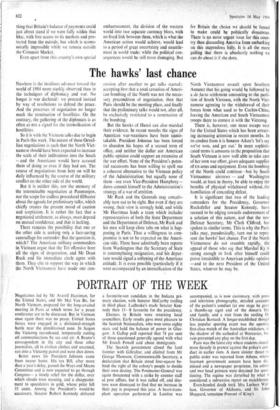The hawks' last chance
Nowhere is the insidious advance toward the world of 1984 more starkly observed than in the techniques of diplomacy and war. No longer is war declared : we proceed instead by way of resolutions to defend the peace. And the processes of negotiation no longer mark the termination of hostilities. On the contrary, the gathering of the diplomats is as often as not a signal for the intensification of hostilities.
So it is with the Vietnam talks due to begin in Paris this week. The nature of these Orwel- lian negotiations is such that the North Viet- namese should have been expected to increase the scale of their infiltrations into the South —and the Americans would have accused them of doing so even if they had not. The course of negotiations from here on will be daily influenced by the course of the military conflict on the other side of the world.
But it is neither this, nor the memory of the interminable negotiation at Panmunjon, nor the scope for endless procedural filibuster about the agenda for preliminary talks, which chiefly creates the present mood of caution and scepticism. It is rather the fact that a negotiated settlement, as always, must depend on mutual confidence, and that is lacking.
There remains the possibility that one or the other side is seeking only a face-saving camouflage for surrender. But the question is, which? The American military commanders in Vietnam argue that the Tet offensive bore all the signs of desperation, and Mr Dean Rusk and his immediate circle agree with them. They cite in support the way in which the North Vietnamese ha. c made one con- cession after another to get talks started : accepting first that a total cessation of Ameri- can bombing of the North was not the neces- sary precondition of negotiation, then that Paris should be the meeting place, and finally that the preliminary talks would not, after all, be exclusively restricted to a termination of the bombing.
But the hawks of Hanoi can also marshal their evidence. In recent months the signs of American war-weariness have been Kim's- takable. President Johnson has been forced to abandon his hopes of a second term of office, and neither the dollar nor American public opinion could support an extension of the war effort. None of the President's poten- tial successors has been willing to spell out a coherent alternative to the Vietnam policy of the Administration; but equally none of them—not even Vice-President Humphrey— dares commit himself to the Administration's strategy of a war of attrition.
Mr Rusk and the Generals may conceiv- ably turn out to be right. But even if they are wrong, their view is strongly held, and while Mr Harriman leads a team which includes representatives of both the State Department and the Department of Defence, Mr Rusk and his men will keep close tabs on what is hap- pening in Paris. Thus a willingness to com- promise s not to be expected on the Ameri- can side. There have admittedly been reports from Washington that the Secretary of State is contemplating resignation, and his depar- ture would signal a softening of the American attitude. It is even possible (particularly if it were accompanied by an intensification of the North Vietnamese assault upon Southern Annam) that his going would be followed by a de facto settiement amounting to the parti- tion of South Vietnam, with the North Viet- namese agreeing to the withdrawal of their forces from what used to be Cochin-China, leaving the American and South Vietnamese troops there to contest it with the Vietcong.
There is, however, one more escape rout for the United States which has been attract- ing increasing attention in recent months. In its crudest form it is Senator Aiken's 'let's say we've won, and get out.' In more sophisti- cated terms it amounts to the proposition that South Vietnam is now well able to take care of her own war effort, given adequate supplies of us arms and equipment. Even the bombing of the North could continue—but by South Vietnamese aircrews — and Washington would, at least in theory, be able to enjoy the benefits of physical withdrawal without, the humiliation of conceding defeat.
It is significant that two of the leading contenders for the Presidency, Governor Rockefeller and Senator Kennedy, have seemed to be edging towards endorsement of a solution of this nature, and that the new Defence Secretary, Mr Clark Clifford, has spoken in similar terms. This is why the Paris talks _may, paradoxically, turn out to repre- sent the hawks' last chance. For if the North Vietnamese do not crumble rapidly, the appeal of those who say that Marshal Ky is strong enough to look after himself could prove irresistible to American public opinion —and to the next President of the United States, whoever he may be.






































 Previous page
Previous page